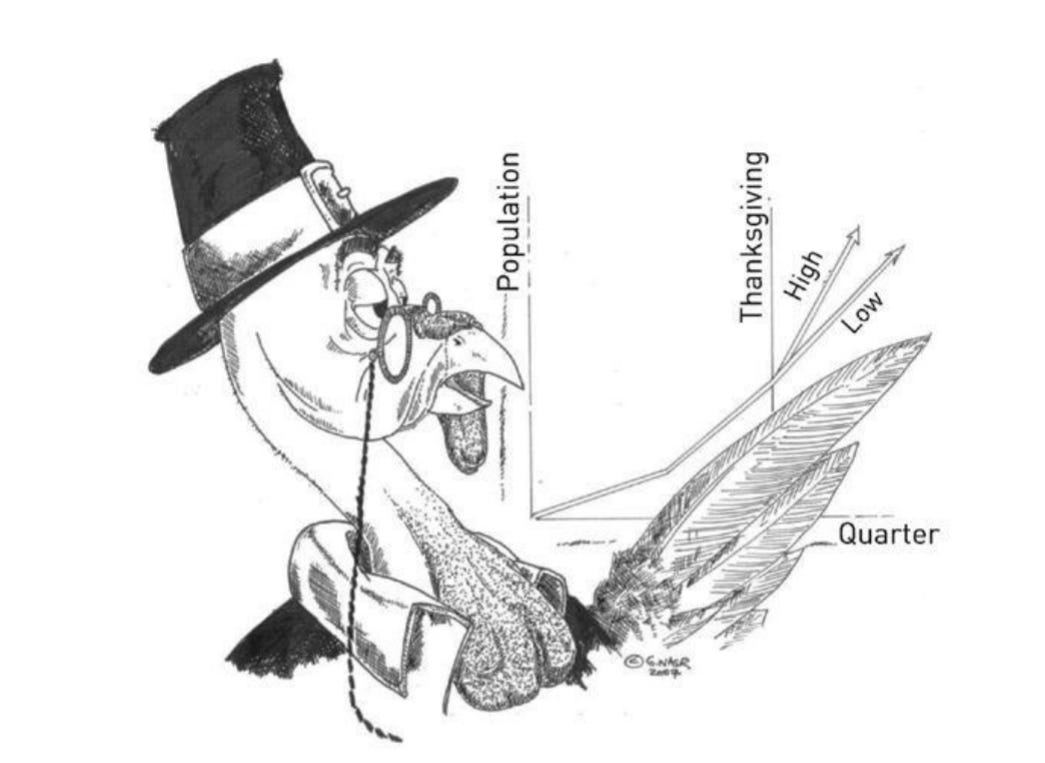Why Feeling Behind Means You Are Ahead

A Letter to Creators Who Feel Behind While Building Something Unprecedented
Taleb’s Turkey
For a thousand days, the turkey was fed by the butcher. Each morning, its internal ‘analysts’ confirmed a comforting truth with increasing statistical confidence: tomorrow would be better than today. The evidence was overwhelming, the pattern undeniably linear, the future soothingly predictable.
Then came Day 1,001: Thanksgiving.
The turkey’s entire worldview collapsed in a single moment. This is how reality works: the most significant events don’t announce themselves. They arrive as sudden breaks from everything that came before.
For the turkey, it was a Black Swan. For the butcher, it was Tuesday.
Society’s Turkey Trap
This is what happens when you think the plans society assigns to you are stable. Much like the turkey, we’re often lulled into a false sense of security by conventional paths. Society sets up a seemingly predictable system: go to school, get a “good” job, climb the corporate ladder. For a while, it feels safe. You get regular paychecks, and the path ahead seems clear. Your internal “analysts” (societal norms, well-meaning advice from elders) confirm that this linear progression is the key to success and fulfillment.
But these well-trodden paths, lived by thousands before you, are often unfulfilling, boring, and repetitive. They’re a form of “Matrix” where your true potential is capped. You’re getting scammed into believing your value is directly tied to your time, and that your contribution is always predictable and quantifiable.
You get paid the same whether you prescribed a life-saving medication or just an aspirin, whether you genuinely innovated or simply processed paperwork. The system optimizes for standardization, not for antifragility—the ability to not just withstand shocks, but to actually benefit from them.
Professions like taxi drivers or prostitutes are antifragile compared to, say, a banker. Why? Because the former operate in environments with constant, immediate feedback and decentralized risk. A taxi driver constantly adapts to traffic, customer demands, and local knowledge; their income is a direct result of their dynamic problem-solving. A prostitute faces direct, real-time feedback on their “product” and reputation, and their success depends on direct engagement with unpredictable human desires.
Conversely, a banker, buffered by layers of bureaucracy and centralized systems, rarely faces direct consequences for small errors. Their “turkey problem” comes when the hidden fragilities in the complex system they operate within finally surface in a Black Swan event—a financial crisis, for example—and their entire worldview (and career) collapses. They’re optimized for stability in a world that is fundamentally volatile.
The fundamental principles that make certain professions, or even ways of operating in life, antifragile are:
- Exposure to Volatility and Small Errors: Constant, small shocks provide valuable feedback and force continuous adaptation.
- Decentralization and Local Control: Less reliance on large, centralized systems means greater agility and less catastrophic failure when one part breaks.
- Skin in the Game: Direct consequences for actions, ensuring that decisions are made with genuine risk at stake.
- Optionality: The ability to take many small bets with limited downside, and unlimited upside.
- Redundancy and Modularity: Having multiple, independent parts that can function if others fail.
Creators, spot this in your life by asking yourself: Am I on a path where the “butcher” (society, traditional employers, predictable systems) controls my Thanksgiving? Am I optimizing for comfort and predictability at the expense of true growth and resilience?
Are my successes due to genuine adaptation and learning from small failures, or am I benefiting from a system that is quietly building up hidden fragilities? Don’t be the turkey. Seek out environments and build systems that allow you to not just survive, but to thrive on uncertainty.
The Paradox of Invisible Progress
If you’re playing the exponential game, you’re supposed to look like you’re losing. For years.
This isn’t a bug in the system. It’s the deepest feature of how complex systems with n-order outcomes actually work.
Skills, insights, and systems compound invisibly before they compound visibly. Every failed experiment adds to your capability stack. Every “wasted” hour builds pattern recognition. Every pivot teaches you something about market forces that can’t be learned any other way.
But here’s the profound part: the accumulation is invisible to you, too.
You can’t feel yourself getting smarter. You can’t sense your taste improving. You can’t measure your intuition sharpening. The person you were last year couldn’t solve the problems you solve automatically today, but that growth is completely transparent to your conscious mind.
This is why most people quit. They’re looking for evidence of progress in the wrong place.
The Growth Delusion
Here’s the paradox that breaks most creators:
You underestimate your growth because you can’t remember how much you didn’t know last year. The gradual accumulation of knowledge, the slow filling of holes, escapes memory. Like the turkey, we fall victim to confirmation bias, believing past trends guarantee future outcomes.
You overestimate your growth because you’re not accounting for the compound effect of consistency. The years before “overnight success” were the true growth period. Success itself can slow your growth down. The absence of immediate problems is often mistaken for evidence of safety—a classic case of confusing absence of evidence with evidence of absence.
Motivation often comes from deprivation. Once the hunger is satisfied, the drive dulls. This is why fixating on outcomes is a trap. Sustainable motivation can’t come from the payoff, which is inherently unpredictable. It must come from genuinely trusting the process—the “playing around” that feels unproductive but builds the foundation for exponential returns.
Linear people are 99% “right” but 100% wrong in their pursuit of asymmetrical upside. The real game is about playing infinite games and building permissionless leverage in which outliers dominate outcomes—not chasing finite wins in a predictable world.
The Inversion of Suffering
Linear people suffer from uncertainty. They crave a clear map, a fixed timeline, a guaranteed outcome. They readily trade unbounded potential for the comforting illusion of predictability.
Exponential people, paradoxically, are disturbed by certainty. If a path feels too safe, too well-defined, too predictable, it signals to them that they’re likely building something trivial—something that already exists or whose potential is capped. Their discomfort isn’t from having uncertainty, but from its absence, which implies they aren’t pushing into the unknown, where true innovation and asymmetric returns reside. They trade the comfort of the known for the possibility of the unprecedented.
Here’s the critical inversion: this discomfort is a signal, not a symptom of failure.
If you’re not grappling with genuine uncertainty, you’re probably not playing a big enough game. If your timeline feels perfectly comfortable, you’re optimizing for the wrong variable—predictability over exponential growth. If you know exactly what you’re building, it’s highly probable you’re merely replicating something that already exists.
This discomfort isn’t a sign you’re doing something wrong. It’s a sign you’re doing something that matters. Crucially, this is the productive discomfort of growth—the mental friction of solving novel problems, the emotional resilience forged in the fires of the unknown.
It’s distinct from the degenerative suffering that arises from avoiding reality or seeking escape through self-destructive behaviors like excessive doom-scrolling, gambling, or porn. Such escapes are predictable paths to decay, not progress. The true exponential player uses the signal of discomfort to lean in, to learn, and to build, not to retreat.
The Compound Delusion
Here’s what nobody tells you about exponential growth: you can’t feel it happening.
Your brain evolved to detect linear change. When something grows 1% every day, it doesn’t register as progress. But 1% daily for a year is 37x growth.
The profound realization: progress and the feeling of progress are completely different phenomena.
Progress is systematic. The feeling of progress is emotional. Progress compounds. The feeling of progress is cyclical. Progress is invisible until it’s obvious. The feeling of progress is immediate but meaningless.
Most people optimize for the feeling of progress instead of actual progress. They choose work that makes them feel productive over work that makes them actually productive.
The Long Game Mathematics
Linear people: Work for 40 years. Retire with enough. Exponential people: Work for 10 years. Retire with everything.
But the mathematics go deeper than this.
Linear systems are additive: 1+1+1+1+1 = 5
Exponential systems are multiplicative: 1×1.1×1.1×1.1×1.1 = 1.46
But complex systems are emergent: 1 + 1 = 3
When you build systems that interact with each other, the whole becomes greater than the sum of its parts. Your writing improves your thinking. Your thinking improves your building. Your building improves your network. Your network improves your opportunities.
This is why the exponential curve eventually goes vertical. It’s not just compound interest. It’s compound systems creating emergent properties.
The Capability Trap
The Gap: The distance between where you are and where you want to be.
The Trap: Measuring progress by the gap instead of by your capability to close it.
Here’s the insight that changes everything: the gap doesn’t shrink linearly. Your capability to close it grows exponentially.
The gap may not shorten at all. You are not wrong to think that you were in the same place you were last year. You actually might be in the same spot, but you just have more skills and knowledge. When they’re incomplete, they’re not able to get you the outcome that you want from life (closing the gap between where you are and where you want to be). But eventually, you can acquire the skills required to close the gap, and with those skills, you can close the gap between where you are and where you want to be overnight.
You can close the gap overnight. But you cannot acquire the skills to close the gap overnight.
When you started, closing a $10,000 gap felt impossible. Now, closing a $100,000 gap feels manageable. The gap got bigger, but your capability grew faster.
Most people quit because they’re measuring the wrong thing. They’re looking at the gap instead of their capability to close it.
The system is the progress. The gap is just the delay between building the system and seeing the results.
It’s like you’re assembling a fucking rocket while linear people are jogging to their destination. Of course, you’re still in the same place where you started building the rocket, but once you launch. Kapoof!
The Asymmetry of Exponential Games
Linear games: Symmetric risk/reward. Work an hour, get paid for an hour. Exponential games: Asymmetric risk/reward. Work for years, get paid for decades.
But the asymmetry isn’t just in the outcomes. It’s in the process.
Linear process: Consistent effort → Consistent results
Exponential process: Consistent effort → Inconsistent results → Massive results
The exponential game has a different relationship with time, feedback, and measurement. You’re not racing against the clock. You’re racing against entropy.
Every day you don’t quit is a win. Every system you build is progress. Every skill you learn is compound interest. But none of this shows up on traditional scoreboards.
The Profound Realization
You are not the same person who started this journey.
The gap between where you are and where you want to be might be the same size, but you are not the same person measuring it.
You have skills you didn’t have. You see patterns you couldn’t see. You solve problems you couldn’t solve. You ask questions you couldn’t ask.
The journey isn’t just changing your circumstances. It’s changing who you are.
And the person you’re becoming is capable of things the person you were couldn’t imagine.
Your Only Job
Build systems. Fill holes. Stay in the game.
The exponential curve will handle the rest.
Most people quit right before the curve goes vertical. They mistake the flat part for failure. They switch games right before they would have won.
Don’t be the turkey. Don’t be the quitter.
Be the one who understands that looking like you’re losing is part of winning the exponential game.
If you’re playing the long exponential game and feel like you’re behind, you’re not behind. You’re exactly where you’re supposed to be. The discomfort is the signal. The uncertainty is the price. The delay is the feature.
— Praise
Here are a few resources and tools to help you build the systems and capabilities we’ve discussed:
- Free Fundamental Principles Reading List: Dive deeper into the foundational ideas that drive exponential thinking. Start your journey here: https://selar.com/firstprinciples
- My Free Newsletter where I drop insights like this every week, earlier: https://crive.substack.com



